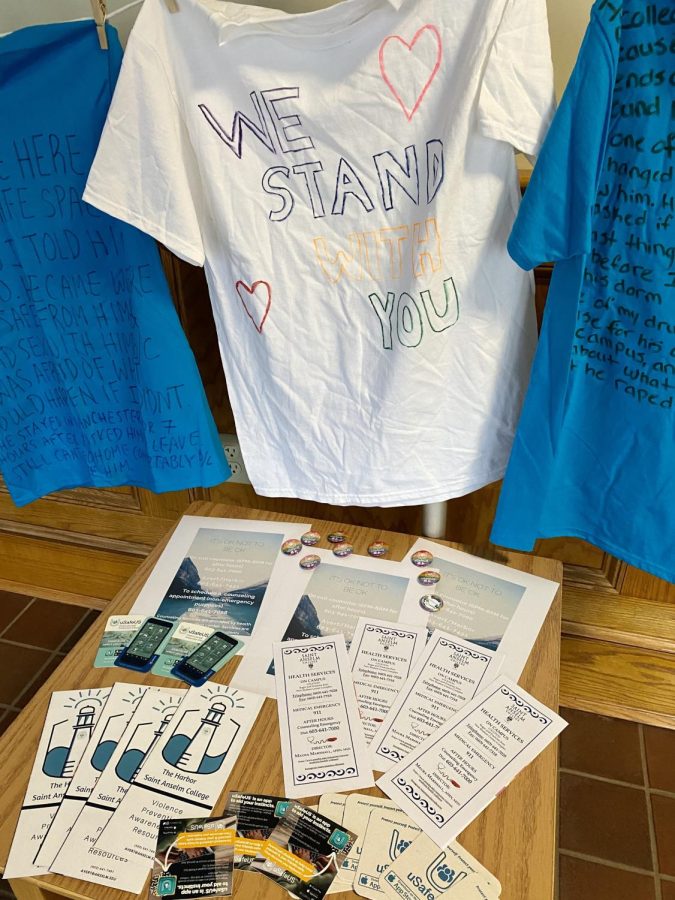Reflect and take a stand against Sexual Assault this SAAM
Messages from survivors and allies on display at Davison Hall as part of the 2022 Clothesline project
We at the Crier value justice and always strive to promote a culture of equality, safety, and respect for all people. April is Sexual Assault Awareness Month (SAAM), a time in which all people should reflect on how they can support victims and promote a safer community.
The National Sexual Violence Resource Center campaign for SAAM this year focuses on creating online communities that promote safety and respect, highlighting the dangers of harassment and exploitation that can occur online as well as in person. In a 2017 study by the PEW research center, 41% of Americans have been the subject of online harassment and 66% of Americans have witnessed harassment directed at others. Additionally, a later replication of this study found that in 2020, 11% of adults experienced sexual harassment online. Dealing with digital sexual harassment can be extremely difficult due to the vast anonymity that users have. It is important to be aware of the content one interacts with or produces and to report harmful online behavior.
According to the annual security report, in 2020 there was one instance of rape, one instance of fondling, and two instances of stalking reported on campus. While someone may initially look at the data and think that it is a good thing that the numbers are relatively low, I ask you to reflect on a few things. First, one case of sexual assault is one case too many. There is absolutely no circumstance in which sexual assault is okay and therefore even 1 instance of rape is a cause for alarm. We should not rest in complacency, we should work to make sure that the number of sexual assault cases is 0.
Second, consider the culture surrounding report filing. Filing a report against someone can be a difficult process and may be triggering for the victim. Plus, it takes time. According to the same annual security report, there were six cases of rape on campus in 2019. However, one of those reports was to the Goffstown police and dealt with an incident that took place in 2017. In a study by RAINN (Rape, Abuse & Incest National Network), it was found that only 20% of female victims ages 18-24 reported to law enforcement. Fear of retaliation, belief that police would not be able to help, and belief that the instance of sexual violence was not important enough were just some of the reasons that participants cited for not reporting. We need to work on creating a culture that stands with survivors and supports them, encouraging justice. Victim blaming and shaming is never the answer.
We as a campus and society should use this month to educate ourselves and others on the realities of sexual assault and prevention. There are multiple groups on campus that have programs throughout the month to promote awareness of SAAM. You may have noticed a gallery of shirts on display, this is called the Clothesline project (sponsored by Active Minds, The Harbor, and the Mental Health Committee). Senior nursing major Maeve Lee who is running the project this year explained it as “a visual representation of sexual assault, domestic violence, and allyship in our community.” The colors of the shirts symbolize different things: teal for sexual assault survivors, purple for domestic violence survivors, and white for allyship. Students are able to decorate the shirts however they choose, some allies shared words of encouragement, and some survivors displayed a message of strength through overcoming their abuse. The shirts remain anonymous and are hung in Davison Hall to “display the prominence of these issues and show support for survivors,” said Lee. I would highly encourage you to consider these shirts, the number of people affected by sexual assault, and their messages, to reflect on how you can offer support to victims.
One of the biggest obstacles to reporting abuse that victims face, especially women, is victim shaming. For women, in particular, the same question is often raised: what was she wearing? Some see a short skirt as an invitation for sexual advances. That is blatantly incorrect. A woman should feel comfortable and safe wearing clothing that empowers her and it should never be used against them, especially dealing with matters of assault or abuse. One way that you can show your support for victims and stand against unjust misconceptions of sexual assault is to participate in ‘Denim Day’ on April 27. Denim Day was born out of outrage over a ruling in the Italian Supreme Court where a rape conviction was overturned due to the fact that the victim was wearing tight jeans, so they must have helped the perpetrator take off the jeans, and therefore gave consent (Peace Over Violence). Participating in Denim Day is one gesture that you can make to stand in solidarity with victims of sexual assault, but I would encourage you also to seek out resources and learn more about how to be an ally.
Sexual assault is a deeply personal, emotional, and often times triggering topic that should be treated with the utmost concern for individual safety. We at the Crier stand up against sexual assault and offer our support to all those who have suffered such horrendous injustices. Even if we do not know your name or your story, please know that you are valued, worthy, strong, and loved. For more information on Title IX and resources for sexual assault, please reach out to The Harbor, located on the lower level of the Jean Student Center.


